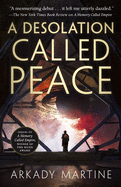The Unstable Present
A Desolation Called Peace, the second Teixcalaan book, the second half of the duology about Mahit Dzmare, the second book I’ve ever written, comes out in a bit less than two weeks – on March 2nd, 2021. That date used to feel very far away, and somewhat unreal. It is now very close, and still feels somewhat unreal. Writing a sequel is a strange process: there’s this whole book behind you, with the weight of its themes and questions distorting your new blank canvas, like gravity distorting spacetime.
If A Memory Called Empire was about what to do about falling in love with a culture that was devouring yours, A Desolation Called Peace is about whether there are better answers than apocalyptic violence when you encounter something so other to you that it is incomprehensible. The one question follows on from the other; for me they’re two halves of the same coin. They’re questions I’ve been obsessed with for a long time.
When I was in grad school – the first time, the time when I was getting a PhD in Byzantine history – I took a course in comparative and global history. That course, if I’m thinking about it from thirty thousand feet up, probably did more to shift what sorts of stories I wanted to tell – and what kind of history I wanted to write, and what kind of policy I want to push for in my current gig as an energy and climate policy person – than anything else I did in my 20s, in grad school or elsewhere. It was that course that assigned an article by Dr. Gonzalo Lamana, called "Beyond Exoticization and Likeness: Alterity and the Production of Sense in a Colonial Encounter". (Lamana, Gonzalo. "Beyond Exotization and Likeness: Alterity and the Production of Sense in a Colonial Encounter," in Comparative Studies in Society and History. 47.1 (January 2005). 4-39.)
If you open up the first page of A Desolation Called Peace, you’ll see that I’ve cited that article in the epigraph that opens the book. It was, and is, that central. A hook into the story. A fishhook, the kind that gets caught in the lip.
Lamana is writing about the meeting of the Inca emperor Atahuelpa and Vincente de Valverde, the clergyman of the conquest party let by Francisco Pizzaro at Cajamarca – an encounter which ended in a bloody massacre. The article is a detailed case study of the hysteria and near-hallucinatory brutality that can emerge as a consequence of narrative mismatch, mutual incomprehensibility, and ideologies of empire. Lamana draws out two mutually unintelligible narratives of the events at Cajamarca – one belonging to the Inca and one to the Spanish. He describes the encounter as an “unstable present”, a moment where the Inca narrative of what was happening and the Spanish narrative of the same events destabilized each other, resulting in chaos and panic. He suggests that Inca and Spanish attempts to insert the other group into their own narratives of power and meaning – rewriting those narratives on the fly as the encounter progressed – were a dangerous guessing game, which eventually failed.
The meeting at Cajamarca resulted in mutual violation of taboos: Valverde gave Atahuelpa a Bible, describing it as the word of God – but in the Inca narrative, a powerful divine object, like Valverde was claiming his Bible to be, would in fact be understandable rather than inert. The Bible did nothing but have words in it; Atahuelpa interpreted it as an insult, and a fake, and dropped it on the floor. "Reality was suspended," Lamana writes. "All possible breaches to Inca protocol occurred at once. [...] The attack was chaotic and frenzied. What has been narrated, following Xerez, as an orderly military deed was to others more of a hallucinatory bloodbath..." The rules of empire-narrative were not only stressed but shattered – the participants in the encounter between two imperial powers found themselves abruptly in the wrong story, operating under the rubric of a reality they could not make comprehensible. The correction that ensued was bloody.
I’m fascinated – horrified and compelled – by this story, and Lamana’s interpretation of it. A decade and a half after first reading his work I’m still thinking about events that have become so meaningless and existentially challenging that people will consider truly horrific actions in order to make them stop. And when I came to write A Desolation Called Peace – after already spending 130,000 words with Mahit Dzmare, who loves an empire and knows that it is a corrosive love, and an imposed one – I wanted to think about whether there were other ways to make a situation marked by deeply threatening meaninglessness come to an end, other than violence. Whether there were any ways out of the trap.
What happens in A Desolation Called Peace is an attempt to answer that question. A lot of it takes place on a Teixcalaanli battleship. There’s interstellar mail fraud. And a kitten. (Technically, several kittens). Also a maybe-genocide, some extremely unwise kissing, and the usual dose of political machination. And under all that: my attempt to come at the tendency of humans to choose violence over narrative discomfort with as much honesty as I can muster.
Arkady Martine is speculative fiction writer and, as Dr. AnnaLinden Weller, a historian of the Byzantine Empire and a city planner. She is currently a policy advisor for the New Mexico Energy, Minerals, and Natural Resources Department, where she works on climate change mitigation, energy grid modernization, and resiliency planning. Under both her names she writes about border politics, rhetoric, propaganda, and the edges of the world. Her first novel, A Memory Called Empire, won the 2020 Hugo Award for Best Novel. Arkady grew up in New York City and, after some time in Turkey, Canada, Sweden, and Baltimore, lives in Santa Fe with her wife, the author Vivian Shaw. Find her online at arkadymartine.net or on Twitter as @ArkadyMartine. Her second novel, A Desolation Called Peace, will be available March 2 everywhere books are sold.

An alien armada lurks on the edges of Teixcalaanli space. No one can communicate with it, no one can destroy it, and Fleet Captain Nine Hibiscus is running out of options.
In a desperate attempt at diplomacy with the mysterious invaders, the fleet captain has sent for a diplomatic envoy. Now Mahit Dzmare and Three Seagrass--still reeling from the recent upheaval in the Empire--face the impossible task of trying to communicate with a hostile entity.
Their failure will guarantee millions of deaths in an endless war. Their success might prevent Teixcalaan's destruction--and allow the empire to continue its rapacious expansion.
Or it might create something far stranger…
Add A Desolation Called Peace to your tbr here. Order it from your local independent bookseller, or order it via Bookshop.org to support independent booksellers throughout the US and the UK. For international shipping, you can try Barnes & Noble. If you prefer audiobooks, here’s your Libro.fm link. You can also request A Desolation Called Peace from your local library — here’s how to get in touch with them. And if you need to order from the Bad River Website, here’s a link that will leverage your order to help get clean water to people who need it.
If you haven’t already, I hope you’ll consider subscribing to this newsletter. The subscriber community is a wonderful and supportive one, and we’re going to spend 2021 finding new ways to stay connected and share experiences. Also, I have a new book out! You can order The Echo Wife wherever books are sold.
In the meantime, care for yourself and the people around you. Believe that the world can be better than it is now. Never give up.
—Gailey





Member discussion